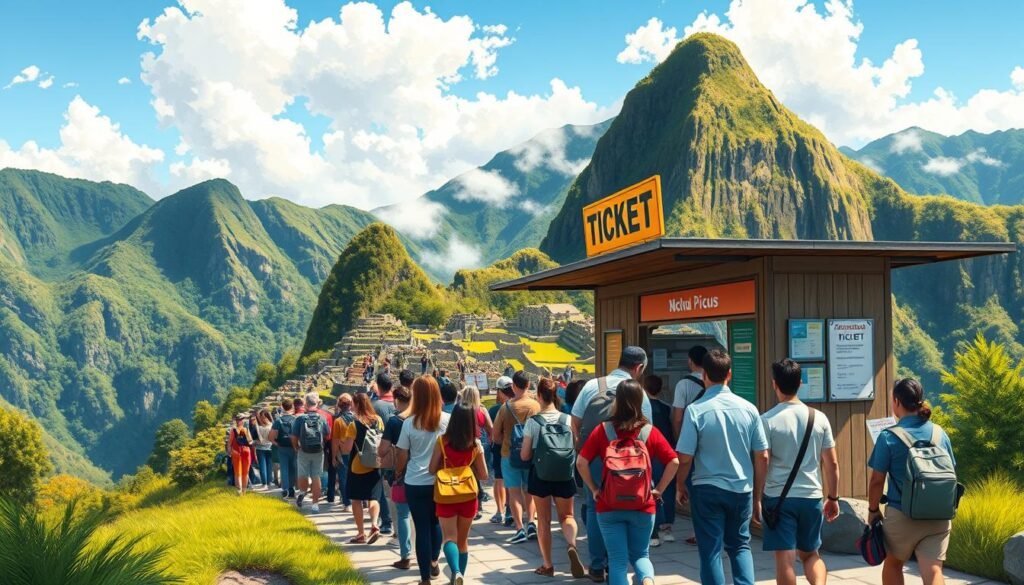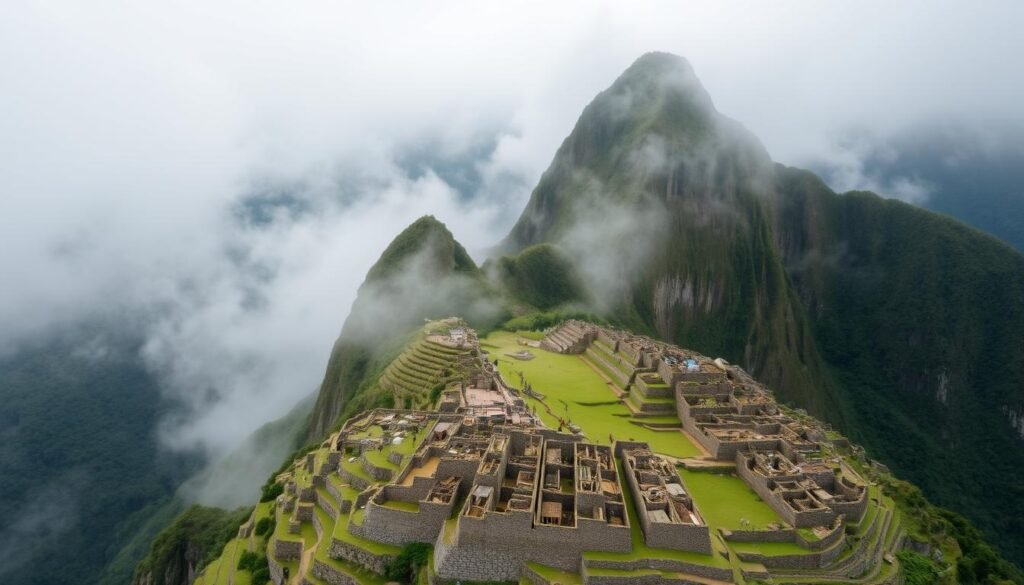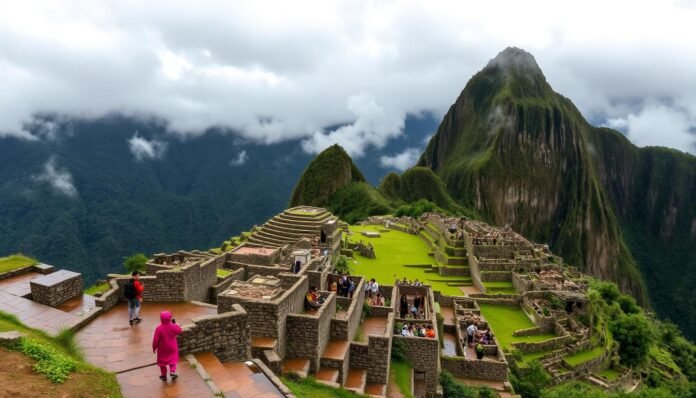Machu Picchu, the iconic Inca citadel, captivates travelers worldwide. Your visit’s timing can significantly impact your experience at this archaeological marvel. Knowing peak seasons and weather patterns helps avoid less-than-ideal times to explore Machu Picchu.
Year-round access doesn’t guarantee a perfect visit. Some periods offer better conditions for your adventure. Understanding these factors is key to planning an unforgettable trip to this ancient wonder.
Key Takeaways
- Certain times of the year are better suited for visiting Machu Picchu than others
- Factors like weather, crowds, and pricing can make some seasons less desirable
- Researching Machu Picchu’s peak tourist seasons is essential for planning your trip
- Rainy season, holiday crowds, and high altitude can present significant challenges
- Choosing the right time to visit Machu Picchu can greatly enhance your overall experience
Understanding Machu Picchu’s Peak Tourist Seasons
Machu Picchu, the famous Incan citadel, attracts visitors from all over the world. Certain times of year bring many tourists, causing crowds and less enjoyable experiences. Knowing these busy periods can help you plan a better trip.
Holiday Season Overcrowding
Christmas and New Year’s Eve are extremely busy at Machu Picchu. Visitors face long lines and limited access to some areas. The crowds can make it hard to fully appreciate the ancient wonder’s beauty.
Summer Break Tourist Influx
Summer vacation brings families and students to Machu Picchu in large numbers. This creates challenges in transportation, accommodation, and site navigation. Planning ahead becomes crucial during these busy months.
Local Festival Impact on Visitor Numbers
Local festivals and celebrations also affect Machu Picchu’s visitor numbers. These events draw more people to the area. Exploring the site during festivals requires extra planning and patience.
Understanding machu picchu peak tourist season and machu picchu overcrowding is key for a great visit. By avoiding busy times, you can enjoy a more peaceful experience at this ancient wonder.
| Time of Year | Visitor Volume | Challenges |
|---|---|---|
| Holiday Season | High | Overcrowding, limited access, long lines |
| Summer Vacation | High | Logistical challenges, navigating crowds |
| Local Festivals | High | Increased visitor numbers, overcrowding |
The Worst Time to Visit Machu Picchu: Rainy Season Challenges
Rainy season at Machu Picchu brings unique challenges for travelers. From November to March, heavy rainfall impacts the visitor experience. Trail conditions, visibility, and safety are all affected.
Rain turns ancient Inca trails into treacherous paths. Wet and muddy terrain increases the risk of slips and falls. Landslides and trail closures can disrupt access to parts of the site.
- Slippery and hazardous trail conditions
- Increased risk of landslides and trail closures
- Reduced visibility due to cloud cover and fog
Clouds and fog often obscure Machu Picchu’s iconic views. This can disappoint visitors who’ve traveled far to see the ancient citadel. The wet environment and poor visibility also raise safety concerns.
Weather patterns can change quickly throughout the day. Travelers should be prepared and exercise caution. Accidents and injuries are more likely in these conditions.
The rainy season offers fewer crowds but many weather-related challenges. Visitors should weigh the pros and cons carefully. Planning is key to ensure a safe and memorable Machu Picchu experience.
Weather Patterns and Their Impact on Your Visit
Machu Picchu’s weather can greatly affect your visit. Extreme temperatures, fog, and storms can change your experience at this ancient site. Understanding these patterns helps you prepare for a memorable trip.
Extreme Temperature Fluctuations
Machu Picchu’s high elevation causes big temperature changes. Mornings and evenings can be freezing cold. Midday sun can bring intense heat.
Pack layers to stay comfortable. Be ready for these weather shifts as you explore the ruins.
Visibility Issues During Foggy Periods
Fog and mist are common in Machu Picchu. They can block views of key landmarks and panoramas. This may make it hard to fully enjoy the ancient city’s grandeur.
Plan for possible low visibility. Be flexible with your schedule to make the most of your visit.
Storm Risks and Safety Concerns
Sudden, intense storms can happen at Machu Picchu. Heavy rain, thunder, and hail are possible. These events can close trails and make surfaces slippery.
Check weather forecasts often. Know the emergency plans to stay safe during your visit.
Understanding machu picchu weather patterns helps you prepare better. You can adapt your plans for a great experience at this amazing Incan site.
| Weather Condition | Potential Impact | Recommended Preparation |
|---|---|---|
| Extreme Temperature Fluctuations | Discomfort, difficulty in maintaining physical comfort | Packing layers, being prepared for temperature changes |
| Foggy Periods | Reduced visibility, obscured views of key landmarks | Being prepared for limited visibility, adjusting expectations |
| Sudden Storms | Safety concerns, trail closures, slippery conditions | Monitoring weather forecasts, being aware of emergency protocols |
High Season Pricing and Limited Ticket Availability
Visiting Machu Picchu during peak seasons can be expensive. Travelers should expect higher costs for machu picchu ticket availability, accommodations, and other services. The increased demand often leads to inflated prices, making budget travel difficult.
Getting entry tickets to the Inca citadel is challenging during machu picchu peak tourist season. Strict quotas are enforced, and popular time slots sell out quickly. Visitors should plan early and be flexible to improve their chances of getting tickets.
| Peak Season | Ticket Availability | Average Price |
|---|---|---|
| December – February | Limited | $65 – $85 |
| June – August | Scarce | $75 – $95 |
Tourists should prepare for premium prices during busy seasons. Planning ahead and being flexible with travel dates can help secure tickets. This approach also helps manage the higher costs of peak season visits.

Dealing with Altitude Sickness: Most Challenging Months
Visiting Machu Picchu in Peru can be life-changing. However, altitude sickness may pose a challenge. It’s vital to know the symptoms, acclimatization, and medical factors before your trip.
Physical Symptoms at High Elevation
At Machu Picchu’s high altitudes, visitors might experience headaches, fatigue, and nausea. These occur as the body adapts to lower oxygen levels. Taking precautions is essential to minimize the impact.
Acclimatization Periods
- The best way to fight altitude sickness is gradual acclimatization. Spend at least a day or two in Cusco before going to Machu Picchu.
- Staying hydrated, resting, and avoiding hard activities help your body adjust to the thin air.
Medical Considerations
Altitude medication can help some people. But talk to a doctor first. They can guide you on the best options for your health needs.
| Month | Altitude Sickness Risk |
|---|---|
| January – April | Moderate to High |
| May – August | High |
| September – December | Moderate |
Understanding machu picchu altitude sickness helps you prepare. Taking precautions ensures a more enjoyable visit to this amazing Peruvian landmark.
Transportation and Accommodation Difficulties
Visiting Machu Picchu during peak seasons can be challenging. The demand for lodging and transport often exceeds supply. This leads to various issues for travelers.
Limited accommodations in nearby towns is a major concern. During the machu picchu peak tourist season, rooms are scarce and expensive. Book lodging early or consider camping or staying farther away.
Getting to and from Machu Picchu can be tricky in busy times. Buses, trains, and taxis may be overcrowded, causing delays. Weather issues can also disrupt travel plans.
| Transportation Options | Pros | Cons |
|---|---|---|
| Train | Scenic views, reliable schedule | Limited availability, higher prices |
| Bus | Affordable, frequent service | Potential overcrowding, longer travel times |
| Taxi/Private Transfer | Flexibility, door-to-door service | More expensive, limited availability |
Plan your Machu Picchu trip early to avoid these problems. Book accommodations in advance and prepare for possible travel changes. This will help ensure a smoother visit to this amazing Inca site.

Humidity Levels and Physical Comfort
High humidity at Machu Picchu can be challenging during the rainy season. It affects your comfort, photography, and equipment. Understanding humidity’s effects is key to a successful trip.
Impact on Photography Conditions
Humidity can be a photographer’s nemesis at Machu Picchu. It causes lens fogging and equipment condensation. Images may appear hazy, failing to capture the site’s true beauty.
Photographers must prepare for these conditions. Protecting gear from machu picchu humidity levels is crucial for quality shots.
Equipment Maintenance Challenges
High machu picchu weather patterns threaten electronic devices and other equipment. Humid conditions can cause corrosion, rust, and malfunctions. Proper storage and regular maintenance are essential.
Use desiccant packs to keep gear dry. This helps ensure equipment stays functional throughout your adventure.
| Metric | Average Value |
|---|---|
| Relative Humidity | 80-90% |
| Temperature Range | 10-20°C (50-68°F) |
| Precipitation | 150-300 mm (6-12 inches) |
Prepare for Machu Picchu’s humidity to ensure a comfortable visit. Pack suitable equipment and be mindful of weather patterns. These steps help you tackle challenges posed by machu picchu humidity levels.
With proper preparation, you’ll make the most of your time at this UNESCO World Heritage Site. Enjoy your adventure at this captivating Peruvian landmark.
Archaeological Site Maintenance Schedules
Machu Picchu, the famous Inca city, needs constant care to keep its history alive. Visitors should know that parts of the site might close for upkeep. The Peruvian government works hard to protect this special place.
During busy machu picchu travel seasons, like holidays and summer, site managers plan repairs carefully. They try to avoid peak times. Still, some areas or trails might be off-limits for a while.
These maintenance times can affect machu picchu ticket availability. Fewer tickets may be sold to balance tourism and preservation. Before you go, check if any areas will be closed.
Research the site’s current status to ensure a great trip. This way, you’ll have the best experience at this UNESCO World Heritage Site.
